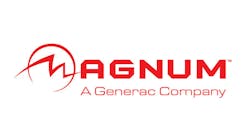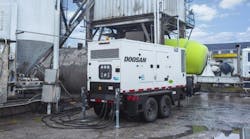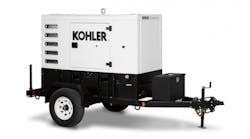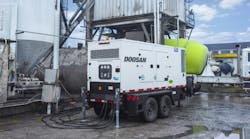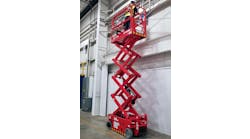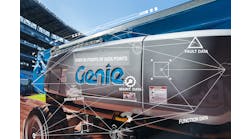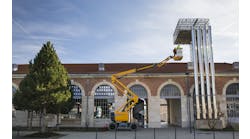Interviews with Generator Manufacturers: New Era of Performance
RER interviews Ben Froland, product manager and Shelly Koeck, vertical marketing manager for Magnum Power Products on why Tier 4 has brought in a new level of performance for generators, why the power rental market keeps growing, and the benefits of propane.
What is new in generator technology – both for your company and, in your opinion, in the generator industry as a whole?
Froland: The most significant change in generator technology is certainly the transition to Tier 4 final emissions engines. On smaller generators, the change may be nearly transparent as those engines utilize a diesel oxidation catalyst only. On larger generators, the change will be much more noticeable with the addition of selective catalytic reduction, diesel particulate filter, or both to those engines. This new class of generators will boast an 80 percent reduction in nitrogen oxides from the previous tier.
How have generators in general improved their performance, capability and functionality in recent years and what are some of the improvements you expect to see in the future?
Froland: While the new engine emissions tier has brought some additional complexity, it has also ushered in a new era of performance for mobile generators. Variable geometry turbos enable engines to respond to block loading faster than ever before. Service intervals have been doubled in many cases and power from a given displacement is higher than ever.
Another significant area of improvement is in generator controls. This was a major focus for Magnum with the introduction of our Power Zone controller. A large, 7-inch color display provides intuitive graphics and analog style gauges for easy operation by the end user. Automatic coarse voltage adjustment ensures the generator voltage coincides with the selector switch position, thereby preventing nuisance calls caused by manual adjustments of the potentiometer. For advanced troubleshooting, analog style gauges populate all values from the engine ECU and input and output positions are displayed graphically.
The power generation rental market has been growing quite a bit, in the U.S. and globally. From your perspective, what are the factors that are driving this growth?
Koeck: Between the recession and the housing market going bust in the U.S. the construction industry was hit particularly hard between 2008 and 2011. For most construction companies their equipment represents their largest expense. During the economic downturn contractors were forced to sell their equipment to keep their companies from going under. After selling off the majority of their equipment they turned to rental houses to get the equipment they needed. Today, many of those contractors continue to rent because they have gotten accustomed to the “only pay when you need it” model instead of tying up large amounts of capital to purchase the equipment. Also, smaller contractors cannot afford to own every piece of equipment they may need for a job so rental offers big advantages.
Rental also gives access to the newest and best equipment. Rental companies will upgrade their equipment regularly due to hours of use. For a construction company, that means they get to use the most advanced equipment with no obligation to buy. Rental houses also have flexible plans so you can use the equipment on a jobsite from one day to as long as one year if you need to, with no responsibility to service the equipment. When you’re done with the item you return it with no long-term commitment. Construction companies large and small are simply not willing to relive the hardships of the previous years, they are timid to make a purchase and add to their overall liabilities as a company. Rental simplifies your budget and reduces your overall liabilities as a company.
Other industries have also contributed to the success of the rental market including specialty markets like the energy sector, which continue to drive the need for power. New technologies like horizontal, hydraulic fracturing have opened up new areas of crude oil production, many of which are off grid and require remote power.
For rental companies that are much involved in power-generation rental, what are some key tips that you can suggest to them about effectively serving this market?
Froland: Get to know your customers and their specific applications. You want to be a problem solver for them; a subject matter expert. If you can step inside their shoes you can better serve them and provide opportunities for their success. Proper generator sizing, power distribution, fueling logistics, and service are ultimately what set apart world class rental companies from their fly-by-night competition. Select an OEM partner for generators that understands your market and the unique demands of rental customers.
The propane-powered generator market has been developing in recent years. What are the benefits of propane-powered generators and what are the market segments for which it is most effective?
Koeck: With the propane prices steadily falling, the spread between diesel and propane is becoming more apparent to the market. Propane prices are expected to become increasingly competitive with diesel and other forms of fuel as the supply continues to increase. With crude oil, gasoline, and diesel fuel prices projected to remain high, propane’s price advantage will help drive growth in the engine fuel segment.
There are many factors that have made propane an attractive alternative fuel. The emissions standards in the U.S. have helped push cleaner alternative fuels as do federal alternative fuel tax credits that provide significant financial incentives for a business to purchase an alternative fuel product. We partnered with PERC to product a solar hybrid light tower that uses propane as its back up fuel source. For the first time ever a customer can get a solar powered hybrid unit for relatively the same price as a standard. The incentives make it possible for our customers to choose a greener source of energy.
In addition to our light tower products we have a full line of gaseous generators capable of running on propane, natural gas, or well gas. We developed these units for the oil and gas industry as a way to save them in both the cost of diesel and overall site emissions. One unit run on well gas can save an operational site more than $200K a year in diesel costs. The propane feature is oftentimes used to bring the generator up online at oil well sites to begin pumping. Once the down hole pump or pump jack becomes productive, the generator will switch to well gas and the propane is used as a backup should there be an interruption in the supply of well gas. Liquid propane has the additional benefit including operating at extremely low temperatures in this environment without any freezing issues.
